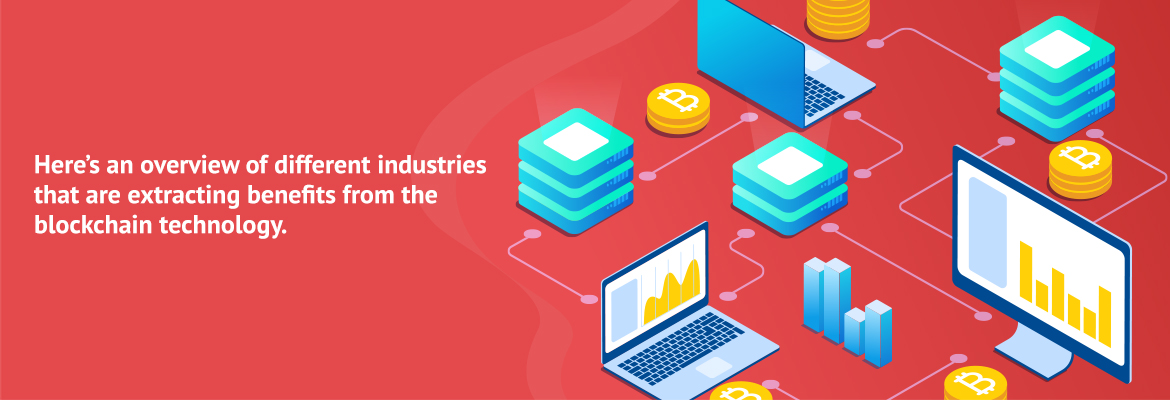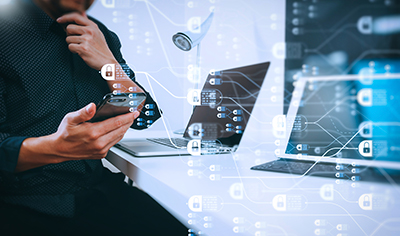Originally invented for the cryptocurrency, blockchain is a technology now found usable in other traits and businesses. With a huge and unanticipated rise in connected devices, IoT, AI, and wearable technology, data safety continues to be the prime concern for individuals and businesses alike. Offering convenient, virtual, and reliable solutions for data security, blockchain has gotten the world to rumble.
The authors of Blockchain Revolution (2016) Don Tapscott and Alex Tapscott said, “the blockchain is an incorruptible digital ledger of economic transactions that can be programmed to record not just financial transactions but virtually everything of value.”
To better understand what is blockchain, imagine a spreadsheet shared across a network of thousands of computers and the network is powerful enough to regularly make modifications to the spreadsheet and you have a picture of blockchain in mind.
Information present in the database using blockchain technology is secure, easily verifiable, and continually reconciled. Not using any single entity for data storage, records on blockchain are truly public and accessible, restricting the hackers to corrupt an otherwise centralized source of data.

Healthcare
Confidentiality of data is a very important concern of healthcare giants. In addition to interoperability, blockchain provides a shield that can help healthcare companies protect their internal and client data. It creates a firewall that lets only authorized professionals, medical practitioners, hospitals, and patients access the reports. With enhanced security, blockchain also offers accuracy and swiftness in diagnosis.
According to Forbes, “by 2020, an estimated 20-30 billion healthcare IoT connected devices will be used globally.” While ensuring security, privacy, and reliability, blockchain technology solutions have the potential to bridge the gaps of device data interoperability around the Internet of Medical Things (IoMT).
The counterfeit drug market is worth hundreds of billions annually, and blockchain, if integrated within processes, is equipped to bring down these numbers. In the healthcare industry, blockchain development technology can be used to improve numerous processes: drug traceability, improvement and authentication of health records, clinical trials precision medicine, genomics research, and Electronic Health Records (EHR).
Supply Chain
Supply chain companies are racing towards blockchain and it’s derivative Decentralized Warehouse System as it ensures transparency, lower forecast and inventory risks, reduced paperwork and administrative costs, and better visibility with compliance.
Secure and neat distribution of data and energy and real-time updating of data allows for extremely efficient supply chains. Software development and product engineering companies have been effectively developing applications that cover entire life-cycle of a block of data – from production place, to warehouse, logistics, retail, and end consumers.
Automotive supplier payments, meat traceability, electric power microgrids, RFID tags for cartons and pallets, and cold chain monitoring, are few examples of the application of blockchain tech in supply chain.
Entertainment
Not turning away from the trend, the entertainment industry too wishes to explore blockchain phenomena. Smart Contract System has helped the creators, writers, and producers to make the content sharing fairer, whereby the revenue on purchases of creative work can be automatically circulated according to pre-agreed licensing agreements.
Experts agree to the fact that yes blockchain is the underlying technology behind Bitcoin, but it can be best put to use in the entertainment industry as every transaction is evident and transparent on the blockchain and rules can be embedded for how the content is used or modified or shared.
With more experiments with blockchain technology services, there will be a clear understanding of its utility and limitations. To explore deeper we need to first figure out where the participants would benefit from both security and transparency aspects of blockchain, like payments, crowdfunding of creative productions, monetization, contract enforcement, digital advertising, and distribution.
Retail
Retail business owners and management have started to identify the value of blockchain and how this technology can change the shape of their businesses in the coming years. Blockchain can be best put to use for retail industry by replacing the middlemen requirements of fees and distribution, connecting customers to the retailers directly. Retailers thrive to gain the trust of customers and blockchain can definitely help them in this area.
Offering security of exchanges and inbuilt relationship management systems, smart contracts system is one such benefit of blockchain. It can help retailers gain trust and reliability at lower operational costs. By integrating blockchain in their retail processes, retailers can deliver undeniable evidence of originality and excellence.
Entailing details of sales, purchases, and buyers, retail companies can make efficient use of crypto wallets supporting numerous digital currencies.
Real Estate
Realtors have already started to make the use of blockchain as a tool to track properties, identify and verify ownership, ensure the authenticity of documents, and transfer property rights. Blockchain and its derivatives have successfully reduced the arduous paperwork related to realty. Before blockchain, the real estate transactions used to take place in the presence of the buyer and the seller. Overhauling the entire process of buying and selling and renting, smart contract system enables real estate agencies to generate a unique number that can be used as cryptocurrencies.
The process is simple yet secure, the moment counter receives the data, it gets scanned and transformed into a digital report. The original documents are immediately sent back to the customer with a physical label placed on it indicating the time and date of receipt and its unique document number.
Stock Trading
Operations in stock trading business are pretty complex to manage. Consuming a lot of efforts, time, cost, the process still doesn’t guarantees complete negation of risk. Though, currently unexplored in this area, experts realize the fact that blockchain technology has the potential to streamline all stock trading processes, simultaneously offering automated and secure solutions for buying, selling, and trading stocks.
It can revolutionize the industry by accelerating the complex transaction processes while reducing, if not completely eliminating, the high risks involved in the trading.
New trends and technologies – AI, IoT, blockchain, and machine learning, are all set to shape the future for good. It is up to businesses how they wish to and how much are they capable of making use of these changes for their benefits.
These are exciting times and if you wish to integrate latest trends in your business offerings or internal processes, feel free to reach out to us with your requirements.





